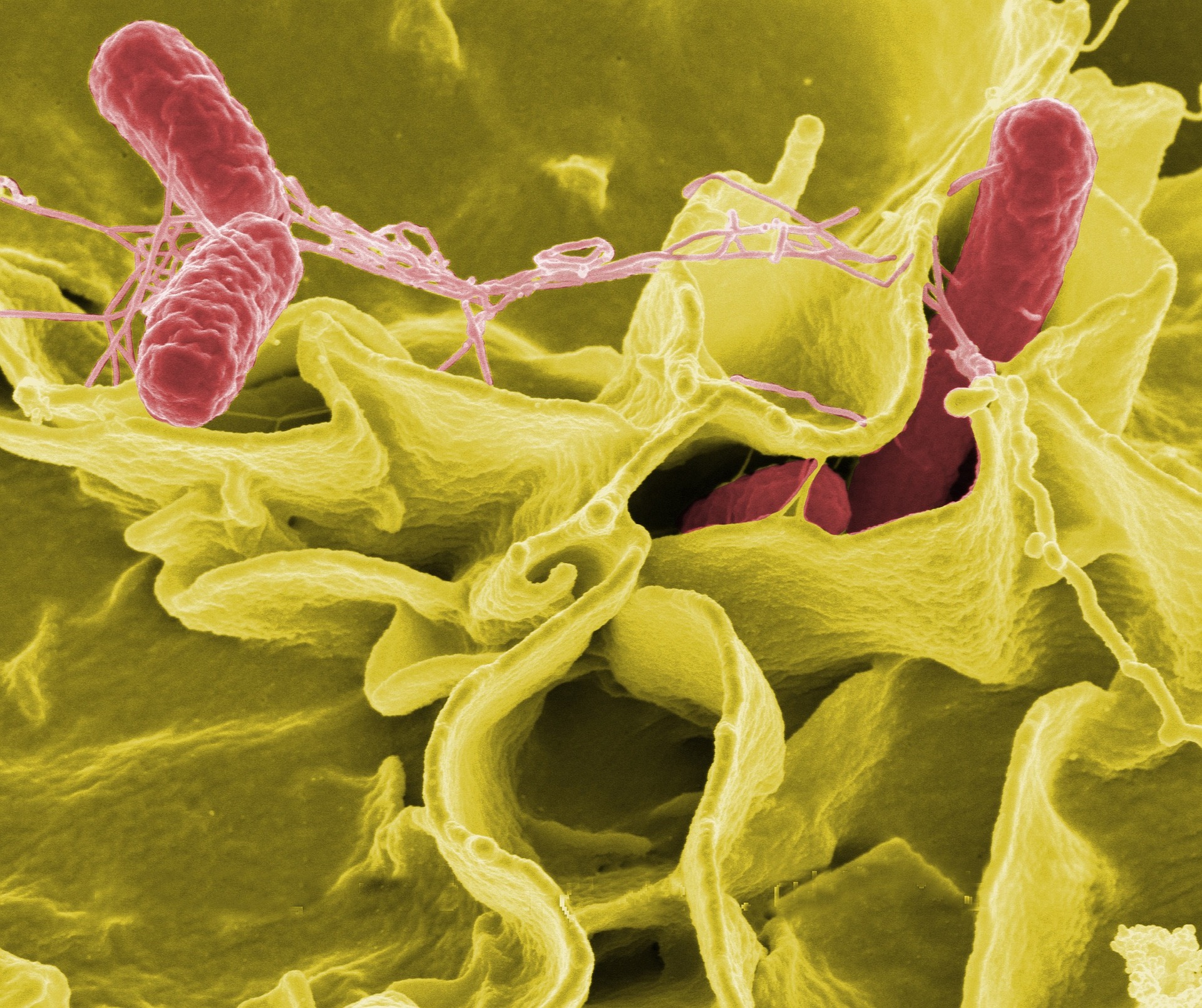Food poisoning occurs after consuming food contaminated with germs such as Salmonella, E. coli (Escherichia coli), and Clostridium perfringens. It can also be caused by food containing toxins, human waste, raw meat, and uncooked meals.
Food poisoning is one of the most common reasons for feeling sick, vomiting, and diarrhea. According to the Food and Drug Administration (FDA), it affects 48 million Americans yearly.![]() Only a fraction of that number – 128 thousand – need hospitalization. Even fewer dies because of foodborne illness, which amounts to 3000 death annually. Depending on the harmful substance or organism that contaminated food, the severity of symptoms varies. Fortunately, in most cases, food poisoning can be treated at home.
Only a fraction of that number – 128 thousand – need hospitalization. Even fewer dies because of foodborne illness, which amounts to 3000 death annually. Depending on the harmful substance or organism that contaminated food, the severity of symptoms varies. Fortunately, in most cases, food poisoning can be treated at home.

Symptoms of food poisoning are not always the same. Their severity and the average time they persist can also differ depending on the source. The most common cause is one of the harmful germs that may contaminate food. See the table below to learn which bacteria cause symptoms of food poisoning and which food sources get contaminated the most often:
| Time For Symptoms To Develop | Symptoms | Name Of The Germ | Food Sources |
| 30 min – 8 hours | diarrhea vomiting stomach cramps feeling nauseous | Staphylococcus aureus (Staph food poisoning) | Food that was kept at the wrong temperature (40°F – 140°F) for more than two hours (for instance, puddings, pastries, sliced meat, sandwiches) |
| Up to 24 hours | high temperature (fever) chills watery diarrhea stomach cramps vomiting feeling nauseous | Vibrio | Undercooked or raw shellfish |
| 6 – 24 hours | stomach cramps diarrhea vomiting and fever (rarely) | Clostridium perfringens | Food kept at the wrong temperature (for instance, meat, gravies, poultry) |
| 6 hours – 6 days | normal or bloody diarrhea high temperature vomiting stomach cramps | Salmonella | Undercooked or raw meats, including chicken and turkey; raw vegetables and fruits; certain animal meat, such as rats, backyard poultry, amphibians, and reptiles; raw juice and milk; eggs |
| 12 – 48 hours | body aches high temperature stomach pain and cramps feeling nauseous headache | Norovirus | shellfish, leafy greens, fresh fruits, contaminated water |
| 18 – 36 hours | blurry vision double vision swallowing problems difficulty moving eyes muscle weakness slurred speech drooping eyelids | Clostridium botulinum (Botulism) | fermented foods, homemade alcohol, food that has been improperly canned |
| 2 – 5 days | high temperature bloody diarrhea stomach pain and cramps | Campylobacter | pets (dogs, cats), raw milk and poultry, contaminated water |
| 3 – 4 days | severe stomach pain and cramps bloody diarrhea vomiting hemolytic uremic syndrome (in 5-10% of infected people) | E. coli (Escherichia coli) | raw vegetables and sprouts, contaminated water, raw milk and juice, raw beef |
| Up to 1 week | weight loss stomach cramps watery diarrhea feeling nauseous tiredness bloating loss of appetite increased gass | Cyclospora | herbs, raw vegetables, and fruits |
| Up to 2 weeks | muscle aches tiredness feeling sick high temperature headache loss of balance seizure neck stiffness feeling confused miscarriage, stillbirth, newborn infection, premature delivery (in pregnant women) | Listeria (invasive illness) | soft cheeses, raw sprouts, hot dogs, raw milk, melons, smoked fish, deli meat |
Some germ infections originating from food may cause severe long-term health issues, including life-threatening conditions. These include:
Dehydration![]() : Loss of water is the most common complication of food poisoning. It occurs because of diarrhea and vomiting that deprive the body not only of fluids but also essential nutrients such as salts and minerals. Most people can quickly avert dehydration by drinking more fluids, but children, older adults, and people with certain illnesses may be unable to replenish fluids at home. People affected by dehydration sometimes need to go to a hospital to get a proper amount of fluids directly into their bloodstream.
: Loss of water is the most common complication of food poisoning. It occurs because of diarrhea and vomiting that deprive the body not only of fluids but also essential nutrients such as salts and minerals. Most people can quickly avert dehydration by drinking more fluids, but children, older adults, and people with certain illnesses may be unable to replenish fluids at home. People affected by dehydration sometimes need to go to a hospital to get a proper amount of fluids directly into their bloodstream.
Symptoms of dehydration are easy to spot. They include dizziness, dry mouth, drowsiness, fainting, urinating less than usual, and swollen feet. If severe, it may also lead to severe health issues, including organ damage, kidney failure, swelling of the brain, and seizure.
Pregnancy complications: Certain bacteria responsible for food poisoning may cause pregnancy complications along with typical symptoms of foodborne illness. These may include stillbirth, sepsis or meningitis in the newborn, and miscarriage.
Systemic disease![]() : Contaminated food may sometimes cause a disease affecting various body parts. It is referred to as systemic disease or infection and is usually not observed among younger people. Elders, people who suffer from medical conditions or have weakened immune system, are more at risk of developing this complication of food poisoning.
: Contaminated food may sometimes cause a disease affecting various body parts. It is referred to as systemic disease or infection and is usually not observed among younger people. Elders, people who suffer from medical conditions or have weakened immune system, are more at risk of developing this complication of food poisoning.
The following infections may occur as a result of food poisoning:
Other complications: Rarely, some health problems develop after food poisoning is dealt with:

Sometimes preventing food poisoning may be impossible, even if the food comes from a reliable source. However, consuming a meal with contaminants or germs does not always result in foodborne illness. Some people are more likely to get food poisoned![]() than others, and these include:
than others, and these include:
Several risk factors contributing to food poisoning are unrelated to age or health. They refer to how food is handled and whether it is of good or lousy quality. Remember the below risk factors to prevent getting food poisoned:
Based on the review of symptoms, doctors can usually tell if a person is food poisoned. Questions related to the recently consumed food and drinks, recent travels, and changes in drugs a person takes typically suffice to diagnose food poisoning. However, the reason behind vomiting, diarrhea, and stomach cramps may be unclear. In that case, a doctor may perform a physical exam, review the patient's medical history, and order additional tests, such as blood and stool tests.
A stool test involves delivering a stool sample to a laboratory for testing. A patient who was ordered a stool test need to get a special container![]() for storing the stool that is available at each pharmacy store. The test can show the presence of bacteria, toxins, parasites, and viruses, which helps rule out health conditions that cause similar symptoms of food poisoning.
for storing the stool that is available at each pharmacy store. The test can show the presence of bacteria, toxins, parasites, and viruses, which helps rule out health conditions that cause similar symptoms of food poisoning.
Blood test helps to determine if a person shows signs of complications from food poisoning like dehydration and various infections. A healthcare professional takes the blood sample, which is then sent to a lab for testing.
Most cases of food poisoning can be treated at home and don't require any medication![]() . Symptoms of dehydration are easily treated by replacing fluids and essential minerals that were lost due to vomiting or diarrhea. Over-the-counter medicines may help with stomach cramps and pain, headaches, and flu-like symptoms.
. Symptoms of dehydration are easily treated by replacing fluids and essential minerals that were lost due to vomiting or diarrhea. Over-the-counter medicines may help with stomach cramps and pain, headaches, and flu-like symptoms.
Severe food poisoning, on the other hand, may require medical treatment. If bacteria or parasites cause it, doctors usually prescribe antibiotics or medicines that are effective against parasites (antiparasitics).
Some doctors also recommend probiotics, a type of medicine that contains a variety of live microorganisms whose purpose is to replace beneficial bacteria in the digestive system.